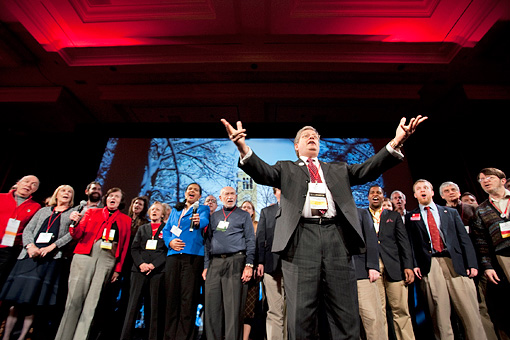
At the Cornell Alumni Leadership Conference in Washington, D.C. Jan. 27-29, a multigenerational group of alumni members of the Glee Club and Chorus, joined by members of the Cornell Club of Washington and led by Bill Welker '73, sang the alma mater at the close of the Saturday luncheon featuring President David Skorton. Jump to related video links
Acclaimed journalists anchor alumni leadership conference
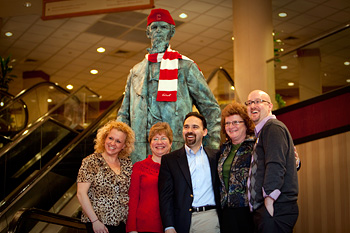
The traveling Ezra Cornell statue stopped at CALC in Washington D.C. for the weekend and many Cornellians posed for photos at his feet. Some at this hotel in the nation's capital, however, unfamiliar with Ezra Cornell, thought the statue was of 16th U.S. President Abraham Lincoln. Jump to related video links
From Cayuga's waters to Capitol Hill, this year's Cornell Alumni Leadership Conference (CALC) shined a Big Red spotlight on leadership writ large.
A record-breaking 967 alumni, campus administrators and students attended the conference in Washington, D.C., Jan. 27-29. The annual event, hosted by the Office of Alumni Affairs, gives volunteers from alumni classes, clubs, affinity groups and other organizations the opportunity to trade best practices, learn about today's Cornell, participate in training and network.
American leadership under the microscope
Amid sessions devoted to reunion planning, social media, Cornell history and philanthropy, the conference's most anticipated event was "The Value of Leadership in the 21st Century," a panel featuring five alumnae in national media. More than 800 CALC participants and 170 livestream viewers watched the conversation, co-hosted by Cornell Mosaic and the President's Council of Cornell Women. Kate Snow '91, a correspondent for NBC's Rock Center with Brian Williams, moderated the discussion by Sheryl WuDunn '81, Pulitzer Prize-winning journalist, best-selling author and business executive; Sheryl Tucker '78, special projects manager for philanthropy at Time Warner and former executive editor at Time Inc.; Cathy Merrill Williams '91, president and publisher at Washingtonian Magazine Inc.; and S.E. Cupp '00, New York Daily News columnist and political pundit.
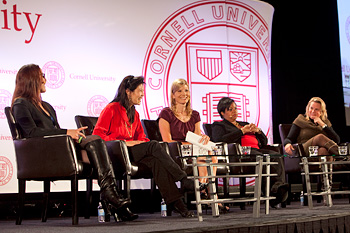
At the Friday afternoon panel discussion, "The Value of Leadership in the 21st Century," alumnae (from left) S.E. Cupp '00, Sheryl WuDunn '81, Kate Snow '91, Sheryl Tucker '78 and Cathy Merrill Williams '91 spoke about leadership, women and higher education in front of about 800 CALC attendees. Jump to related video links
The session opened with a discussion about the failings of contemporary American leadership that encompassed the political, corporate and educational spheres. Cupp and Merrill rested much of the blame on Capitol Hill partisanship, noting that political leaders must work together and set aside party politics, particularly when jobs are at stake. But Cupp's contention that today's young people are lazy and should accept more responsibility for their economic situations drew a quick retort from Merrill. "I really don't think that kids are lazy. Those of us who work with Cornell students don't think that."
For Tucker and WuDunn, short-term decision making by corporations -- and the homogeneity of their leaders -- highlighted a systemic problem. "If the name of the company was Lehman Brothers and Sisters," said WuDunn, "maybe that would have put more diversity of opinion on the board and they would not have made some of the decisions that they did."
"Diversity powers innovation, " said Tucker, arguing that solving problems with different perspectives and experiences will ensure more out-of-the-box thinking than having "like minds all in the room together."
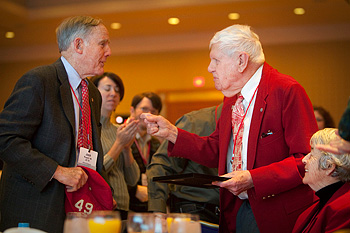
Jack Gilbert '49, standing at right, and his wife Inger Gilbert '49, seated at right, were the recipients of the 2012 William "Bill" Vanneman '31 Outstanding Class Leader Award. Jack Rupert '49, left, congratulates the couple at CALC.
"I don't love identity politics," cautioned Cupp, who argued that the most qualified people should fill leadership roles, regardless of gender.
All of the panelists agreed that the educational system needs repairing. U.S. prominence rose due to "education for the masses," said WuDunn. "We didn't care whether you got a Cornell education or a community college education. In fact, what makes an economy tick is better education at the community-college level. We need to get everybody educated. We're dipping now on all the global statistics."
Snow asked the panelists what advice they would offer Cornell's leaders about the CornellNYC Tech campus. WuDunn said the campus is an opportunity to show global leadership through a transformative act of "creative destruction." Inviting alumni to send their suggestions to Day Hall, she said, "Cornell has a chance to build something organically from the very beginning."
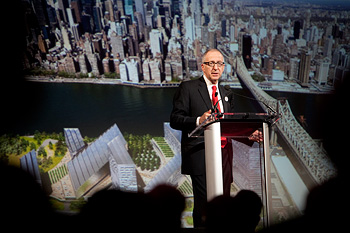
Cornell President David Skorton was met with a standing ovation as he mounted the stage following the December 2011 video clip of New York City Mayor Michael Bloomberg announcing Cornell as the winner of the tech campus competition. Jump to related video links
Cornell's global leadership ambitions
The tech campus also figured prominently at the weekend's other major gathering: a luncheon with President David Skorton and "Cornell Now" campaign co-chairs Steve Ashley '62 and Andrew Tisch '71.
They told an audience of more than 900 that the strategic vision behind the $4.75 billion campaign goal is to position Cornell as one of the world's top 10 universities. Skorton noted that his top four strategic priorities are faculty renewal, student access, public service and engagement, and greater internationalization.
Mounting the stage after a video clip of Mayor Michael Bloomberg's press conference announcing Cornell as winner of the tech campus competition, Skorton was met with a standing ovation.
Skorton said that the tech campus will ultimately increase the number of applied sciences and technology graduate students studying in New York City by about 50 percent. He also emphasized its impact on New York City's and the state's economy. "Alumni and faculty from The Technion have started more companies on NASDAQ than the whole European Union," he said, noting the Israeli university's partnership with Cornell is expected to give the project an entrepreneurial boost and lead to thousands of new jobs.
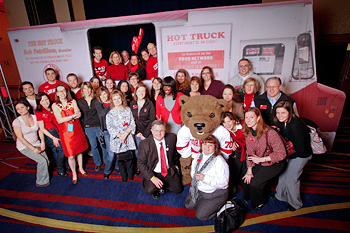
Cornellians posed for photos in a full-size Hot Truck cutout, enjoyed Cornell Dairy Bar ice cream and feasted on a robust tailgate buffet for the Saturday night Big Red Tailgate, where Touchdown, the unofficial Cornell mascot, circulated through the crowd and three screens covered live Big Red sports action.
He echoed WuDunn's call for alumni ideas and guidance. "You don't have to wait for an invitation," he said. "I learn from you when you give feedback."
When asked by an alumna how she could help Cornell despite not having the capacity to give a multimillion-dollar gift, Skorton said, "What you're doing by hosting students and networking with students and coming here today is helping steer the ship. Please take this as genuine: It means every bit as much as a $350 million gift. Only our aggregate putting the shoulder to the wheel will move us forward."
Related videos:
Video: The student inside Touchdown, The Big Red Bear, at CALC
Video: The Ezra statue visits CALC in D.C.
Video: Saturday luncheon, "An Afternoon with David J. Skorton"
Video: Friday panel discussion, "The Value of Leadership in the 21st Century"
Related link:
Cornell Chronicle's The Essentials: Grin and bear it